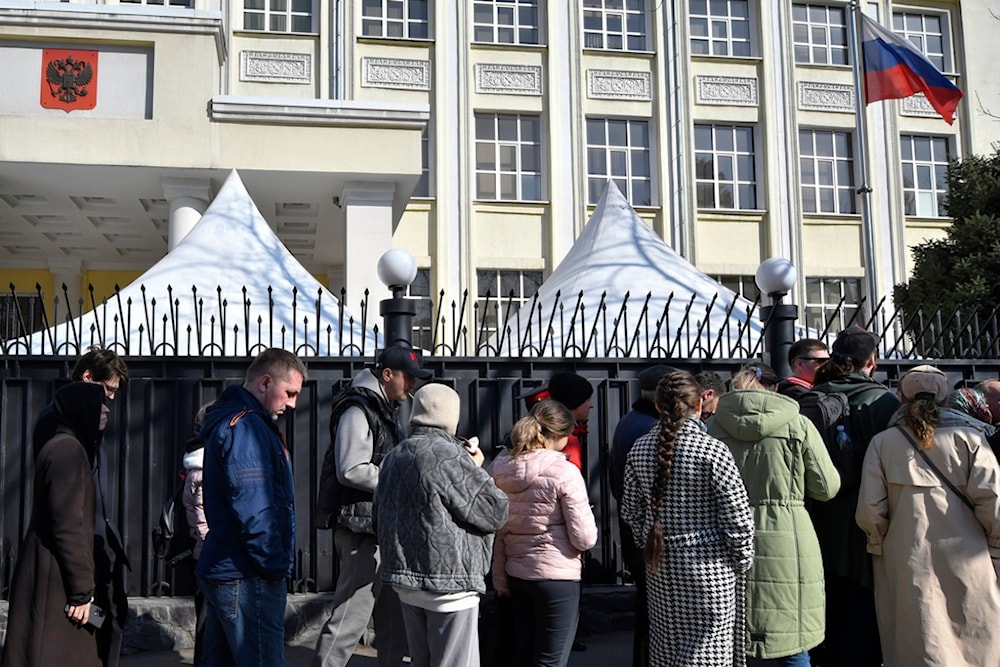Putin leading with 87.8% in Russian presidential election: Exit polls
The voting turnout reached 74.22% as of 6 pm Moscow time.
-

Voters queue outside the Russian Embassy in Bishkek, Kyrgyzstan, Sunday, March 17, 2024. (AP)
As polls closed in Russia's presidential election, an exit poll conducted by the Russian Public Opinion Research Centre (VCIOM) revealed that President Vladimir Putin is in the lead with an overwhelming 87.8% of the votes.
Confirming Putin's lead, the Central Election Commission announced on Sunday that Vladimir Putin is leading in the presidential election. The commission's statement follows the closure of polling stations across the country.
In addition to Putin's substantial lead, other candidates in the race garnered varying levels of support.
Presidential candidate Kharitonov secured 4.6% of the votes, while Davankov obtained 4.2%. Slutsky trailed with 3% of the votes.
An estimated 1.2% of the ballots were declared invalid, according to the VCIOM exit poll.
The head of the Russian Election Commission provided further insight, revealing that the voting turnout reached 74.22% as of 6 pm Moscow time. This indicates a high level of participation among Russian citizens in the electoral process.
Obvious victory
A likely victory for Putin can be attributed to several reasons, the first being what the Russians perceive as a defense of Russia's national security through the war in Ukraine.
The conflict in Ukraine stems from the 2014 Euromaidan revolts, triggered by then-President Yanukovych's decision to suspend an EU association agreement in favor of closer ties with Russia.
In February 2014, violent clashes between protesters and security forces led to numerous casualties and prompted Yanukovych to flee Ukraine, which led to a coup d'etat and the establishment of a Western-backed interim government.
Read more: Russia fooled on Minsk agreements: Putin
In March 2014, due to high rates of aggression on ethnic Russians in Ukraine, Russia decided to annex Crimea from Ukraine. Ukraine attempted to regain control of these territories but failed to achieve its goal.
In September 2014, the Organization for Security and Co-operation in Europe (OSCE) announced plans to mediate a ceasefire agreement known as the Minsk Agreement to halt the fighting and establish a framework for a political resolution.
It was later revealed in December 2022 that the ceasefire was part of a plot to "give Ukraine time" to strengthen itself, according to ex-German Chancellor Angela Merkel, which effectively constitutes a betrayal towards Russia.
Economic resilience
A second contributing factor is what can be described as Russia's economic resilience in the face of US sanctions.
Instead of facing a catastrophic downturn as most Western economists have predicted, the Russian economy experienced a recession of lesser severity and shorter duration than anticipated.
Moreover, while inflation emerged as a recent concern, even prompting worries from Putin himself, recent data has shown a stabilization in prices.
Russia's economic resilience is partly attributed to past stimulus efforts, with corporations and households maintaining large cash reserves.
Sanctions evasion has further boosted the economy, as companies have adapted supply chains and established new trading relationships, particularly with China.
Russia's resilience against sanctions suggests that a rapid shift to a multipolar world is in the making, especially considering that the BRICS organization has recently come to include new members, including a key US ally, Saudi Arabia.
As de-dollarization gains momentum, questions arise about the future of US economic hegemony and its implications for global economic dynamics.
Discussions about the creation of an alternative financial market and reserve currency have likewise gained traction.
Read more: Capital control helped protect Russia's economy: Putin

 4 Min Read
4 Min Read








